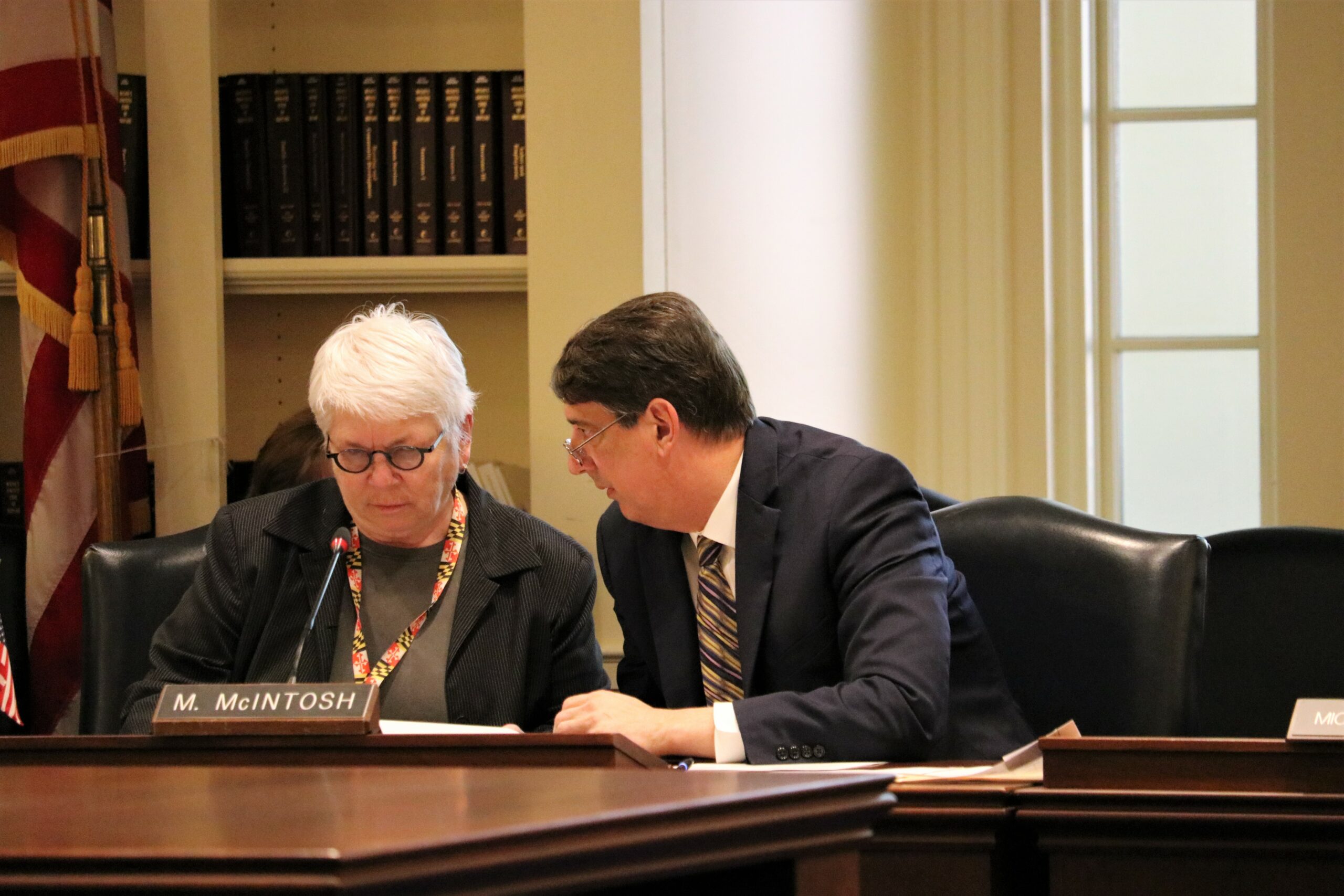
The first phase of the Hogan administration plan to offset a massive drop in revenues brought on by the COVID-19 pandemic appears to be a thoughtful, if painful, approach to budget-cutting, the General Assembly’s top fiscal leaders said this weekend.
Lawmakers were responding to the governor’s plan to cut $1.45 billion from the fiscal year 2021 budget. They were briefed on the plan Friday.
“It was not as bad as we thought it was going to be… in terms of the impact on employees,” House Appropriations Committee Chairwoman Maggie L. McIntosh (D-Baltimore City) said Saturday. “We were told massive layoffs, massive cuts to salary, furloughs. None of those are in this first round.”
The Board of Public Works will consider $672 million in cuts and other budget actions on Wednesday.
The board — made up of Gov. Lawrence J. Hogan Jr. (R), Treasurer Nancy K. Kopp (D) and Comptroller Peter V.R. Franchot (D) — is authorized to reduce agency spending up to 25% when the legislature is not in session.
Most of the remaining $845 million in cuts (to what lawmakers approved as a $47.9 billion budget) requires General Assembly approval and will be presented to the legislature in January in the form of a Budget Reconciliation and Financing Act.
The board’s July 1 meeting occurs on the first day of fiscal year 2021, the start of what is widely expected to be a multi-year period of fiscal strain. Income taxes and sales tax receipts are the state’s two biggest sources of revenue –– and both have been hammered by the downturn in the economy.
“I’m concerned particularly about the employee portions,” Sen. Guy J. Guzzone (D-Howard), chairman of the Senate Budget & Taxation Committee, said Sunday. “I feel our employees are underpaid to begin with, in large part. So I would hope that whatever happens, we can make them whole at the end of the process.”
McIntosh said House leaders will also “want to protect, as much as we can, state employees,” education, health care and assistance to the state’s most vulnerable residents.
The Hogan plan eliminates 92 positions. It also seeks $95 million in salary reductions across the state workforce. And it reduces agency spending (in some cases the maximum 25%), draws $38 million from the state’s reserve fund, and shifts certain pay-as-you-go capital items to become debt-funded.
Among other actions recommended by the administration:
- State-supported colleges and universities would lose 9% of their funding, $150 million;
- The Maryland Higher Education Commission would see a 10% reduction, $57 million;
- Maryland’s disparity grant program, which is intended to help lower-income counties that lack the ability to raise large sums through the property tax, would take a $40 million hit — or 21.5%;
- The Departments of Health and Education would each take a 1% cut, $70.7 million and $57 million, respectively.
“The unprecedented magnitude of the state revenue losses that we’ll be facing —combined with the uncertainty of any future aid being handed down by the federal government — has forced reductions to practically all areas of the state budget,” said Nicholas Pepersack, a top Department of Budget and Management official, said in a statement.
“Out of consideration for those impacted most by the COVID-19 pandemic, we are putting a priority on maintaining funding for public health programs, economic and workforce development initiatives, and social safety net benefits for vulnerable Marylanders,” he added. “We will continue to closely monitor the Governor’s efforts to secure additional federal aid on behalf of the states, and we are prepared to adjust our budget-balancing plan accordingly.”
McIntosh, one of the legislature’s leading voices on fiscal matters, said she needs a better understanding of how individual counties will be impacted by the proposed cuts before she can support them.
While legislative analysts are still poring over the cuts the administration released on Friday, she is concerned that cuts to the disparity grant and teacher retirement programs may have an outsized impact on Prince George’s and Baltimore City.
“Although I haven’t got the analysis yet, you may be looking at a situation where two of the counties that are in most need, in terms of their school systems, may have been disproportionately affected, but we need to find that out,” McIntosh said.
She and various advocacy groups have also expressed the concern that the Board of Public Works is being asked to vote before an upcoming deadline for employers to file income-tax withholding, the state’s largest single source of revenue.
“We’re doing these cuts July 1, but because the comptroller moved the tax collection date to July 15, we don’t even know what the revenues are,” she said. “So why shouldn’t we do this August 1 instead of July 1?”
Both McIntosh and Guzzone said it is crucial that the federal government provide additional aid to states and localities, to avoid significant cuts to programs and employee layoffs.
While Congress approved the CARES Act this spring, those funds were only intended only to assist states, counties and transit systems with spending directly related to the coronavirus crisis, not to backfill revenues from lost economic activity.
“We still have a lot of lost revenue that isn’t directly increased costs, it’s because of the economy,” Guzzone said. “Sales tax revenues are down 30%. Having some support from the federal government certainly would go a long way” to avoiding “more and tougher cuts as time goes on.”.
Guzzone said lawmakers were told the state is preparing three stages of cuts, depending on revenues and whether the federal governments approves additional aid to the states.
The BPW is no stranger to emergency budget-cutting. The panel had to trim state spending significantly during the Great Recession.




 Creative Commons Attribution
Creative Commons Attribution